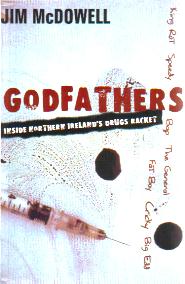Godfathers,
Inside Northern Ireland's Drugs Racket

Jim
McDowell.
Gill & Macmillan, Dublin, Éire.
2001. ISBN 0 7171 3298 6 .
£7.99
.
£7.99
"The
devil finds work for idle hands"
GODFATHERS
can be read on two levels, as a collection of 'true crime' stories detailing the
activities of a colourful selection of Northern Ireland's gangsters, drug
dealers and paramilitaries. On another more serious, political level it sheds
light on some of the darker aspects of the current peace process.
Written in a tabloid style by Jim McDowell, the Northern Editor of the Sunday World newspaper, the book was hurriedly brought out as a tribute to the journalist Martin O'Hagan, murdered by the Loyalist Volunteer Force in September 2001, allegedly for exposing their involvement in drug dealing.
I
have qualms about the style of parts of the book and some of the tactics used by
the author. The overall theme is one of good versus evil, the Sunday World
and its staff versus the evil pushers. No distinction is made between say
cannabis, ecstasy and heroin. No attempt is made to examine why young people are
turning to drugs or what possible solutions there might be. The basic stance of
the book is 'just say no'.
Many
of the very serious allegations made against people named in the book are from
unattributed sources. Few of those identified have ever been convicted in a
court of law and many are no longer around to answer the charges made against
them. The book does however provide a disturbing insight into
developments in both Republican and Loyalist paramilitary groups since the
ceasefires of the mid 1990's.
On the Republican side, Sinn Féin and the IRA are keen to retain the role of 'protectors of the people'. At its most cynical, the tactic of killing drug dealers through the front group 'Direct Action Against Drugs' is a vote winner in nationalist areas. Sensitive to public opinion in both Northern Ireland and the USA, the IRA refuse to deal drugs directly, unlike the various republican splinter groups, but McDowell alleges that they 'licence' dealers in Republican areas. Those who refuse to pay end up as victims of DAAD.
To
maintain a cosmetic distance between Sinn Féin, the IRA and DAAD, and to allow
the British and Irish Governments to maintain their pretence that the Republican
ceasefire is intact, 'clean' weapons with no forensic history linking them to
the IRA were imported from the USA. Three IRA members were arrested and
convicted in Florida in 1999 for procuring these new weapons to fight the
continuing cold war in Northern Ireland.
After
the ceasefires, RUC resources were freed up to crack down on the racketeering
carried out be both sets of paramilitaries.
Always mindful of their public image, the IRA began to invest in
legitimate businesses to raise funds. Less sophisticated Loyalist groups, eager
to maintain their power bases and lifestyles, and less concerned about their
public image, turned to drug dealing. The bloody inter Loyalist feuds of recent
years, which were in part fuelled by arguments over drugs are well documented in
the book.
The
story of the Northern Ireland drugs business is unlikely to end in the
foreseeable future. Godfathers details how heroin use has gained a
strong foothold in Ballymena and Bangor and an article in the Belfast Telegraph
(12th August 2002) claims that the IRA are preparing to reactivate DAAD in the
run up to the Assembly elections next year to win back hard-line supporters.
David N.